- Home
- Naguib Mahfouz
The Cairo Trilogy Page 4
The Cairo Trilogy Read online
Page 4
Amina left the room for a few minutes and returned with a basin and pitcher. Placing the basin by her husband's feet, she stood ready and waiting with the pitcher in her hand. Her husband straightened up and held his hands out to her. She poured the water for him. He washed his face, rubbed hishead, and rinsed thoroughly. Then he took the towel from the sofa cushion and set about drying hishead, face, and hands, while his wife carried the basin to the bath. This task was the last of the many duties she performed in the big house. For a quarter of a century she had continued to discharge it with an ardor undimmed by ennui. To the contrary, she did it with pleasure and delight and with the same enthusiasm that spurred her on to undertake the other household chores from just before sunrise until sunset. For this reason she was called “the bee” by women in her neighborhood, in recognition of her incessant perseverance and energy.
She returned to the room, closed the door, and pulled a pallet out from under the bed. She placed it in front of the sofa and sat cross-legged on it. In good conscience she did not think she had any right to sit beside him. Time passed without her speaking. She waited until he invited her to speak; then she would. Her husband slumped back against the sofa cushion. After a long evening of partying he looked tired. His eyelids, which were red at the edges from his drinking, drooped. He was breathing heavily as if inebriated. Although he was in the habit of drinking to the point of intoxication every night, he postponed his return home until the effects of the wine had worn off and he had regained control of himself. He wished to protect his dignity and image at home. His wife was the only member of his family allowed to see him after he had been out carousing. The only effect of the drinking she could remark was the smell.
She had never encountered any alarming or perverse conduct from him, except when they were first married, and she had chosen to overlook that. Paradoxically, by keeping him company at this hour, she reaped a chattiness and expansiveness in his conversation she could rarely gain when he was completely sober. She well remembered how distressed she had been when she first noticed he was coming home drunk from his evening escapades. To her mind, wine had always suggested brutality and craziness and, most shocking of all, an offense against religion. She had been disgusted and scared. Whenever he came home, she had suffered anbearable torments. In time, experience had revealed that on h is return from his partying he was more gentle than on any other occasion and not so stern. His look was more tender and he was much more talkative. She grew to enjoy his company and stopped worrying, although she never forgot to implore God to pardon his sin and forgive him. She dearly wished he would be that good-humored when he was sober and in his right mind. She was thoroughly amazed that this sin made him more amiable. She was torn for a long time between her hatred for it, based on her religious training, and the comfort and peace she gained from it. She buried her thoughts deep inside her, however, and concealed them as though unable even to admit them to herself.
Her husband spared no effort to safeguard his dignity and authority. His moments of tenderness were fleeting and accidental. As He sat there, a broad smile might appear on his lips at a memory that cropped up from his happy evening. At once he would get control of himself and press his lips together while stealing a glance at his wife. He would find her as usual, in front of him, with her eyes lowered. Reassured, he would return to his memories and hisheart that cherished them as though from an unquenc lable thirst for the pleasures of life. It seemed he could still see the party, composed of a select group of his favorite friends and chums. In the midst of them was one of those moonlike beauties who shone in his life from time to time. He could still hear the jokes, wisecracks, and witty comments for which he had such a talent, stringing one after the other, when he was animated by wine and music. He recalled his clever remarks with a care and attention accented by wonder and self-satisfaction. He remembered their effect on people and the success and delight they occasioned, making him everyone's best friend.
It was tiardly surprising. He often felt the role he played at these parties was so significant that it was practically the ultimate anyone could hole for in life. His career as a whole was a necessary task he performed in order to gain some hours filled with drink, laughter, song, and flirtation to be spent in the chummy company of his pals. Now and then some of the sweet, catchy tunes that were sung at their hap py parties ran through hishead. He abandoned himself to them and sighed, as they drifted away from him, “God is most great”. He loved the singing as much as the drink, laughter, companions, and pretty girls. He would not tolerate a party without song.
It was nothing for him to journey a long way, to the outskirts of Cairo, in order to hear a renowned male vocalist like al-Hamuli, Muhammad Uthman, or al-Manilawi, wherever he resided. Thus their tunes found shelter in his hospitable soul, like nightingales in a leafy tree. He became a music expert and an acknowledged authority on lyrics, tunes, and music appreciation. He loved song with both his soul and his body. Spiritually he was transported and overwhelmed. Physically his senses were strongly aroused, setting him dancing, particularly hishead and hands. For this reason, he had unforgettable spiritual and physical associations with lines from songs like: “So why do you torment me and shun me?” or “What will we know tomorrow? … What will we see the following day?” and “Listen, then, and pay attention to what I'm telling you”. Any one of these tunes with its associated family of memories would suffice to bring his intoxication to a boil.
Transported by the music, he would nod hishead, smile lasciviously, snap his fingers, and sing along when alone. Singing, however, was not an isolated pleasure attracting him for itself. It was a flower in a bouquet, gaining beauty from the setting and contributing to it. How welcome it was in the company of a close friend and loyal comrade when combined with vintage wine and pleasant conversation. To devote himself to it alone, to listen to it at home played on a phonograph, however fine and agreeable that might be, lacked the appropriate atmosphere, ambiance, and environment. How preposterous to think hisheart should be satisfied with that! What he liked was to interpose a witty remark between one tune and the next to set everyone laughing, to take a sip from a full glass before starting the music again, and to observe its effect in the face of a friend or the eye of a chum. Then they would all join in expressing their admiration by saying, “Praise the Lord.”
The creation of memories was not the only result of his partying. Another of its other virtues was the tendency it produced in him to be kind to his obedient, submissive wife. It was what she longed for when she was with him. He was companionable and talkative. He would tell her his innermost thoughts, thus making her feel, if only for the moment, that she was not just his servant but also a partner in his life. He proceeded to discuss household matters with her. He told her he had directed a merchant he knew to buy up a reserve of clarified butter, wheat, and cheese for the house. He attacked the rise in prices and the scarcity of necessary commodities caused by this war, which had been giving the world a poundi ig for the past three years. As always when he mentioned the war, he began cursing the Australian troops who had spread through die city like locusts, destroying the land.
The tiuth was that he had a special reason for resenting the Australians. Their tyranny separated him from the Ezbekiya Garden entertainment district, which he had abandoned in defeat, except for the few rare opportunitieshe could snatch. He could not stand to expose himself to soldiers who openly plundered people cf their possessions and took pleasure in abusing and insulting them without restraint.
He began to ask after the “children,” as he called them, making no distinction between the eldest of them, a clerk in al-Nahhasin School, and the youngest, who was a pupil in Khalil Agha Elementary School. Then he inquired suspiciously, “And Kamal? You better not be covering up his mischief.”
The woman thought of her young son, whose innocent pranks she did in fact conceal. Her husband did not recognize that there could be innocent games or amusements. She replied meekly, “He
respects his father's commands.”
Her husband was silent for a moment. His thoughts seemed to be wandering. Once more he was harvesting memories from his happy evening. Then his memory slipped back to the events of the day before the party. He remembered all at once that it had been a momentous day. In his condition, he did not feel like keeping from hei: anything that floated to consciousness. He said as though addressing himself, “What a fine man Prince Kamal al-Din Husayn is! Do you know what he did? He refused to ascend the throne of his late father so long as the British are in cbarge.”
The woman had heard the day before of the death of Sultan Husayn Kamal, but this was the first time she heard the name of his son. She could not find anything to say, but moved by her feelings of veneration for the speaker and afraid not to comment on something he said, she responded, “May God have mercy on the Sultan and bless his son”. Her husband continued his remarks: “Prince Ahmad Fuad, or Sultan Fuad as he will be known from now on, accepted the throne. The celebration came to a climax today with his investiture. Then he went in a procession from Bustan Castle to Abdin Palace. Praise to God, the Everlasting.”
Amina listened to him with interest and delight. She was interested in any news of the outside world, about which she knew almost nothing. Her delight was inspired by the affectionate attention she could boast of because her husband had spoken to her of such weighty matters. Moreover, the knowledge represented by the conversation gave her pleasure, because she could repeat it to her children, especially her two daughters, who were as totally ignorant of the outside world as she. She could think of nothing better to repay him for his generous sentiments than to repeat in hishearing the prayer she knew he heartily endorsed. She was also expressing her own sincere emotions when she said, 'Our Lord can return our sovereign Abbas to us.”
The man shook hishead and murmured, “When? … When? Only the Lord knows. All we read about in the papers are British victories. Will they really win or will the Germans and Turks be victorious in the end? Answer our prayer, O God.”
The man closed his eyes from fatigue and yawned. He stretched out, saying, “Take the lamp back to the sitting room.”
The woman got to her feet and took the lamp from the table. Before she left the room, she heard her husband belch. She stammered, “Health and strength.”
3
THROUGH THE stillness of the early morning, when the dark dawn sky was transfixed by arrows of light, there rose from the courtyard oven room the sound of dough being kneaded rhythmically, like the beating of a drum. Amina had been up for about half an hour. She had finished her ablutions and prayed before going down to the oven room to rouse Umm Hanafi, the servant, who was in her forties and had been a maid in the house when she was a gii I. She had left the house to marry and had returned after her divorce. While Umm Hanafi worked the dough, Amina busied herself preparing breakfast.
The house had a wide courtyard with a well at the far right. The well's opening had been fitted with a wooden cover once children's feet began pattering across the ground. That was followed by the installation of water pipes. On the far left, by the entrance to the women's quarters, were two large chambers. The oven occupied one, devoted to baking, and the other served as a storeroom.
The oven room, although isolated, had a special claim on Armna's affections. If the hours she had passed inside it were added up, they would be a lifetime. Moreover, the room came alive with the delights of each holiday in its season, when hearts, merry with the joys of life, kept an anxious watch. Appetites were whetted by all the delicious foods prepared there for each holiday in turn, like the sweet fruit compotes and doughnuts for Ramadan or the cake and pastries for Id al-Fitr marking the end of Ramadan. For Id al-Adha, the Feast of the Sacrifice, there was the lamb that was fattened up and pampered only to be slaughtered while the children watched. Thus the universal rejoicing was not without a mournful tear. The blaze of the fire gleamed from the depths of the oven through the arched opening, like a flaming firebrand of joy in the secret recesses of the heart. It seemed both one of the ornaments of each festival and its harbinge r.
If Amina, in the upper stories, felt she was a deputy or representative of the ruler, lacking any authority of her own, here she was the queen, with no rival to her sovereignty. The oven lived and died at her command. The fate of the coal and wood, piled in the right-hand corner, rested on a word from her. The stove that occupied the opposite corner, beneath shelves with pots, plates, and the copper serving tray, slept or hissed with flame at a gesture from her. Here she was the mother, wife, teacher, and artist everyone respected. They had full confidence in everything she produced. The only praise she ever succeeded in eliciting from her husband, if he did favor her with praise, was for a type of food she prepared and cooked to perfection.
Umm Hanafi was the right arm of this small empire, whether Amina directed the work herself or allowed one of her daughters to practice this craft under her supervision. Umm Hanafi was a stout woman who was shapeless and formless. The single goal governing her ample increase in flesh had been corpulence. Considerations of beauty had been ignored. She was totally satisfied, for she reckoned corpulence to be beauty of the finest sort. No wonder, then, that all her household chores seemed almost secondary to her in comparison with her primary duty, which was to fatten up the family, or more specifically the females, with miraculous remedies that were not only charms to produce beauty but its secret essence. Although these potions did not always do the trick, they had proved their value more than once and deserved the hopes and dreams invested in them. It was not surprising that Umm Hanafi should grow plump in these circumstances. But her weight in no way diminished her vigor. The moment her mistress woke her, she rose, ready to get to work. She hastened to the bread basin, and soon there rang out the sound of the kneading, which served as an alarm clock in this house. It reached the children on the first floor and the father on the top floor, notifying everyone that it was time to rise.
Mr. Ahmad Abd al-Jawad rolled over on his side and opened his eyes. He scowled at once, furious at the sound that had disturbed his sleep. He suppressed his anger, however, since he knew he had to wake up. Normally his first sensation after regaining consciousness was of his hangover. He struggled against it forcefully and sat up in bed, although still dominated by a desire to go back to sleep. His boisterous nights were not able to make him forget his daytime duties.
He would awake at this early hour, no matter how late he had been in getting to bed, in order to leave for his shop a little before eight. During his siesta he would have ample time to make up for his lost Jeep and to restore his energy for another night on the town. Thus the moment he awoke was the worst of his whole day. He would leave his bed, swaying from exhaustion and dizziness. He encountered a life devoid of any sweet memories or warm feelings. They seemed to have changed into a pounding in his brain and eyelids.
The blows of the dough went on relentlessly. Fahmy was one of the earliest of those awakened on the first floor. He was easy to rouse, even though he stayed up late concentrating on his law books. The first image that came to him on waking was of a round face with black eyes at the center of its ivory surface. He whispered to himself, “Maryam”. Had he yielded to the temptation, he would have remained under the covers for a long time to be alone with the phantom visitor who came to keep him company with the tenderest affection. He would gaze at her to hisheart's content, converse with her, and reveal one secret after another to her while drawing close to her with a daring not imaginable except in this warm repose early in the morning. As usual, however, he postponed this reverie until Friday morning and sat up in bed. He turned to look at his brother sleeping in the adjoining bed and shouted, “Yasin, Yasin! Wake up.”
The youth's snoring was cut short. He snorted in annoyance and muttered rather nasally, “I'm awake. I woke up before you.”
Fahmy waited, smiling, till the other began snoring again. Then he yelled at him, “Wake up!”
Grumblin
g, Yasin rolled over in bed. The covers slipped off one side of bis body, which resembled his father's in size and bulk. He opened his bloodshot eyes, which gazed vacantly beneath a brow contracted in a disgruntled frown. “Phooey… how did it get to be morning so fast? Why can't we sleep till we've had enough? Discipline, always discipline. We might as well be in the army”. He reared up, supporting himself on his hands and knees. He shook hishead to expel its drowsiness. He happened to look over at i:he third bed, where Kamal lay sleeping. No one would wrench him out of his sleep for half an hour. Yasin said enviously, “The lucky kid!” As hishead cleared a little, he sat up with his legs crossed under him on the bed. He rested hishead in his hands. He wished it was filled with the sweet thoughts that brighten daydreams, but he, like his father, awoke with enough of a hangover to keep dreams at bay. He saw the musician Zanuba in his imagination, though not with his normal delight. All the same, his lips parted in a smile.
In the adjoining room, Khadija had gotten out of bed without having to use the dough alarm. She, of all the family, most resembled her mother in her energy and early rising. Aisha generally was awakened by the movement of the bed when her sister sat up and jumped to the floor. Khadija intentionally rocked the bed and thus started a quarrel and exchange of insults, which through repetition had become a coarse kind of joke. Although Aisha remained awake, she did not rise after she had stopped bickering but surrendered to one of her long happy daydreams.
Life stirred and activity spread throughout the first floor. Windows were opened and light poured in. Close behind came a draft of air, bringing with it the grinding of the wheels of the mule-drawn Suares omnibus, the voices of workmen, and the cry of the hot-cereal vendor. Movement continued between the two bedrooms and the bath. Yasin appeared, his stocky body in a loose-fitting house shirt, along with Fahmy, who was tall and slim, resembling, except for this slenderness, his father. The two girls went down to the courtyard to join their mother in the oven room. Rarely will two such dissimilar people belong to one family. That Khadija was a brunette was not a flaw, but the features of her face were noticeably out of proportion with each other. Aisha, on the other hand, was a blonde who radiated a halo of beauty and good looks.

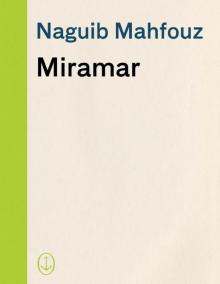 Miramar
Miramar The Mummy Awakens
The Mummy Awakens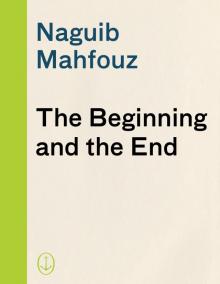 The Beginning and the End
The Beginning and the End Respected Sir, Wedding Song, the Search
Respected Sir, Wedding Song, the Search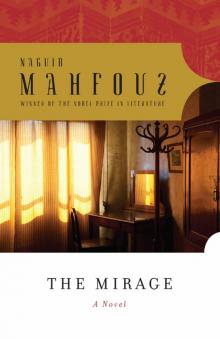 The Mirage
The Mirage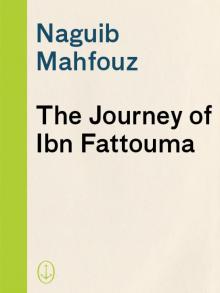 Novels by Naguib Mahfouz
Novels by Naguib Mahfouz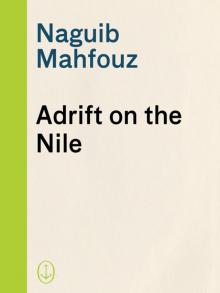 Adrift on the Nile
Adrift on the Nile Karnak Café
Karnak Café Heart of the Night
Heart of the Night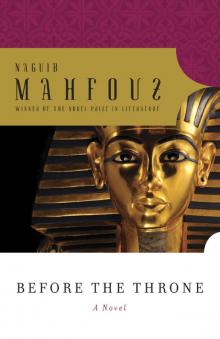 Before the Throne
Before the Throne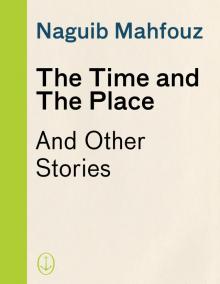 The Time and the Place: And Other Stories
The Time and the Place: And Other Stories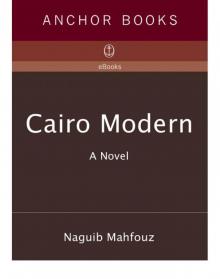 Cairo Modern
Cairo Modern Arabian Nights and Days
Arabian Nights and Days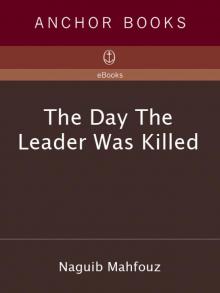 The Day the Leader Was Killed
The Day the Leader Was Killed Morning and Evening Talk
Morning and Evening Talk Three Novels of Ancient Egypt Khufu's Wisdom
Three Novels of Ancient Egypt Khufu's Wisdom Akhenaten: Dweller in Truth
Akhenaten: Dweller in Truth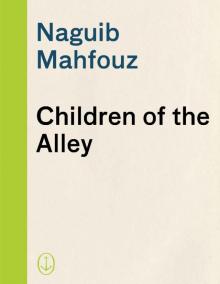 Children of the Alley
Children of the Alley Voices From the Other World
Voices From the Other World The Harafish
The Harafish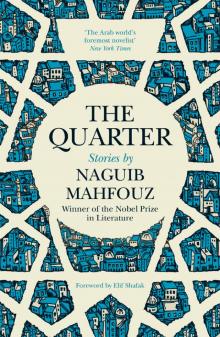 The Quarter
The Quarter The Seventh Heaven: Supernatural Tales
The Seventh Heaven: Supernatural Tales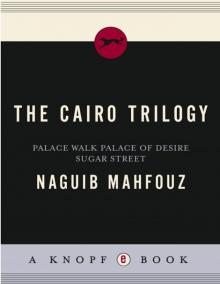 The Cairo Trilogy: Palace Walk, Palace of Desire, Sugar Street
The Cairo Trilogy: Palace Walk, Palace of Desire, Sugar Street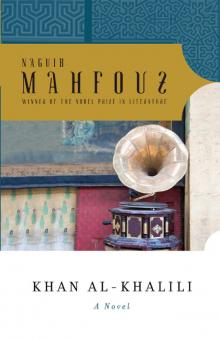 Khan Al-Khalili
Khan Al-Khalili Three Novels of Ancient Egypt Khufu's Wisdom, Rhadopis of Nubia, Thebes at War
Three Novels of Ancient Egypt Khufu's Wisdom, Rhadopis of Nubia, Thebes at War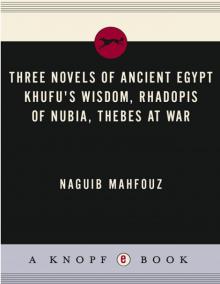 Three Novels of Ancient Egypt
Three Novels of Ancient Egypt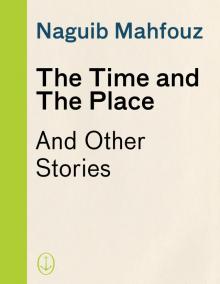 The Time and the Place
The Time and the Place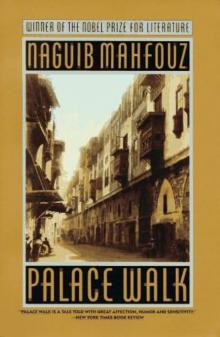 Palace Walk tct-1
Palace Walk tct-1 Akhenaten
Akhenaten The Seventh Heaven
The Seventh Heaven The Thief and the Dogs
The Thief and the Dogs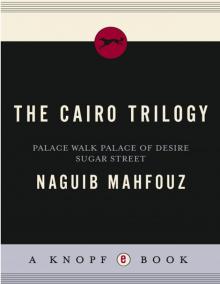 The Cairo Trilogy
The Cairo Trilogy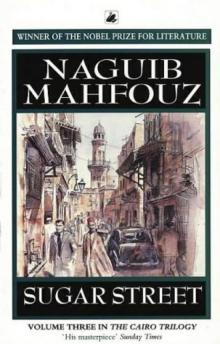 Sugar Street tct-3
Sugar Street tct-3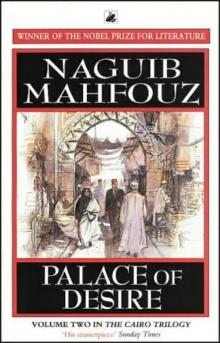 Palace of Desire tct-2
Palace of Desire tct-2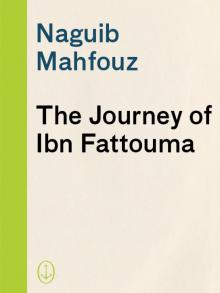 The Journey of Ibn Fattouma
The Journey of Ibn Fattouma